Chromosomal/cytosolic, telomeric, epigenetic, and senescence alterations acquired across the lifespan
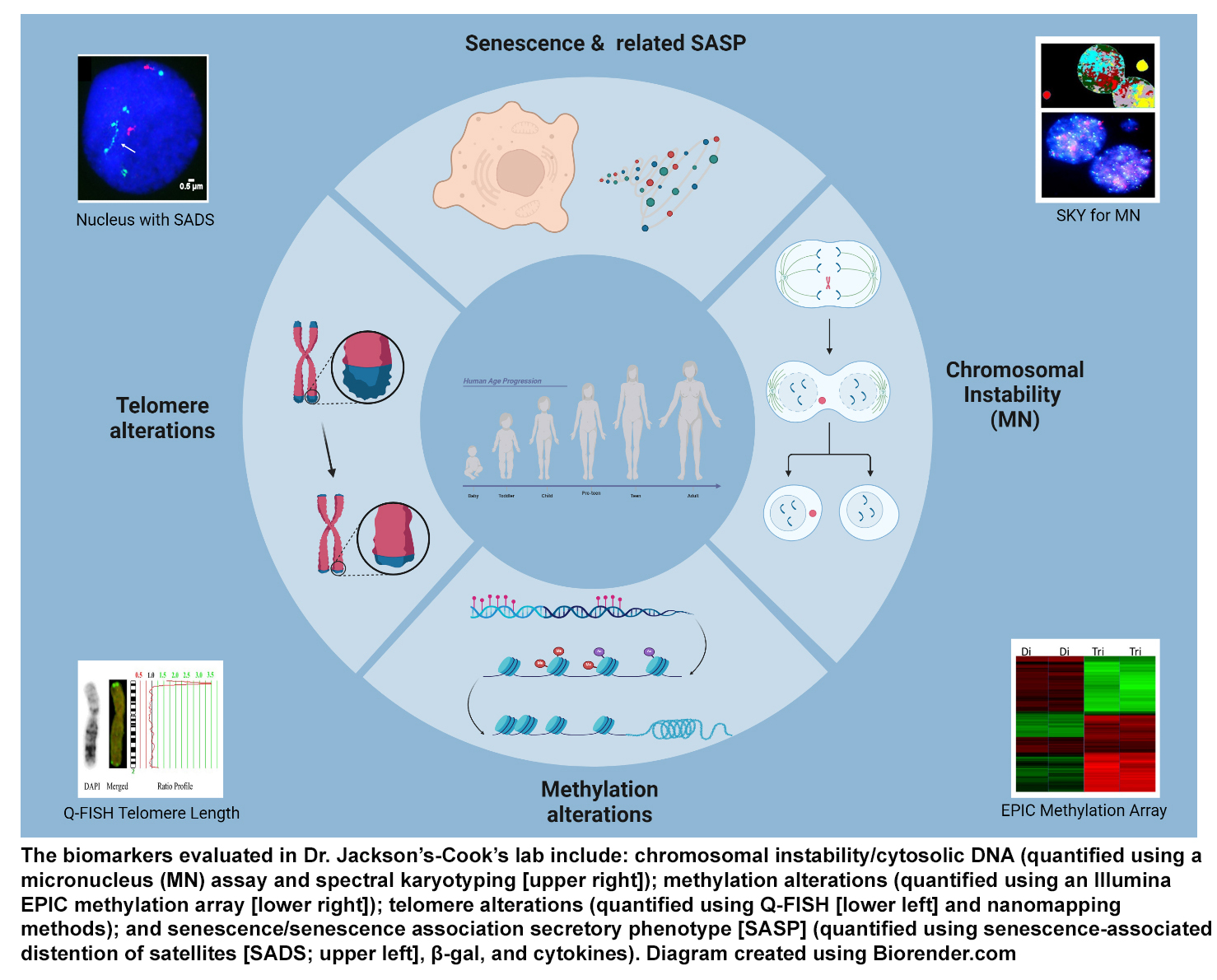 As people age, some of their body cells acquire genetic changes. A newly recognized type of acquired genetic change, called cytosolic DNA, has emerged as an important player in either triggering or mediating other age-related biological alterations that can lead to health conditions. The overarching goal of Dr. Jackson-Cook’s research is to identify biological changes related to cytoplasmic self-DNA that are acquired with age, with the expectation that this knowledge will provide foundational information needed to develop new health screening tests and/or treatments. To meet this goal we are studying: (1) people with mosaic Down syndrome; and (2) twins (in collaboration with the MATR).
As people age, some of their body cells acquire genetic changes. A newly recognized type of acquired genetic change, called cytosolic DNA, has emerged as an important player in either triggering or mediating other age-related biological alterations that can lead to health conditions. The overarching goal of Dr. Jackson-Cook’s research is to identify biological changes related to cytoplasmic self-DNA that are acquired with age, with the expectation that this knowledge will provide foundational information needed to develop new health screening tests and/or treatments. To meet this goal we are studying: (1) people with mosaic Down syndrome; and (2) twins (in collaboration with the MATR).
Mosaic Down Syndrome Project
Grant “A mosaic Down syndrome model system comparing isogenic trisomic/disomic cells to unmask trisomy 21-related genomic, epigenomic, and senescence changes acquired across the lifespan” (R01HD111943), Jackson-Cook, PI
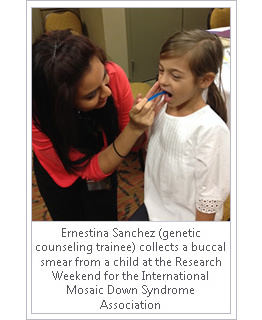
Dr. Jackson-Cook has the largest repository of people with mosaicism for trisomy 21 in the world and is expanding research related to mosaic and non-mosaic Down syndrome. She serves as the Scientific Advisor for the International Mosaic Down Syndrome Association (IMDSA). This support group’s members participate as community-empowered partners in her research program. The goal of this study is to better understand Down syndrome and mosaic Down syndrome and the health and development problems people with mosaic Down syndrome or Down syndrome might experience, with a focus on changes that occur from infancy to adulthood. Her group has initiated a longitudinal study to compare biological patterns in isogenic disomic and trisomic cells from 65 people with mosaicism (for example, at ages 1, 15, and 20). The research team will also identify health traits in the participants with mosaicism and compare symptoms with biomarker patterns. The results of this study will enable her team to “unmask” trisomy 21-associated changes in biological cascades and will provide the first assessment of the role of cytosolic DNA in health conditions associated with Down syndrome/mosaic Down syndrome. Importantly, this research could identify new therapeutic targets that could transform our approach for developing treatments to alleviate symptoms of health conditions acquired by people with mosaic or non-mosaic Down syndrome.
Supported by the Eunice Kennedy Shriver National Institute of Child Health & Human Development of the National Institutes of Health [NIH/NICHD/NIA]
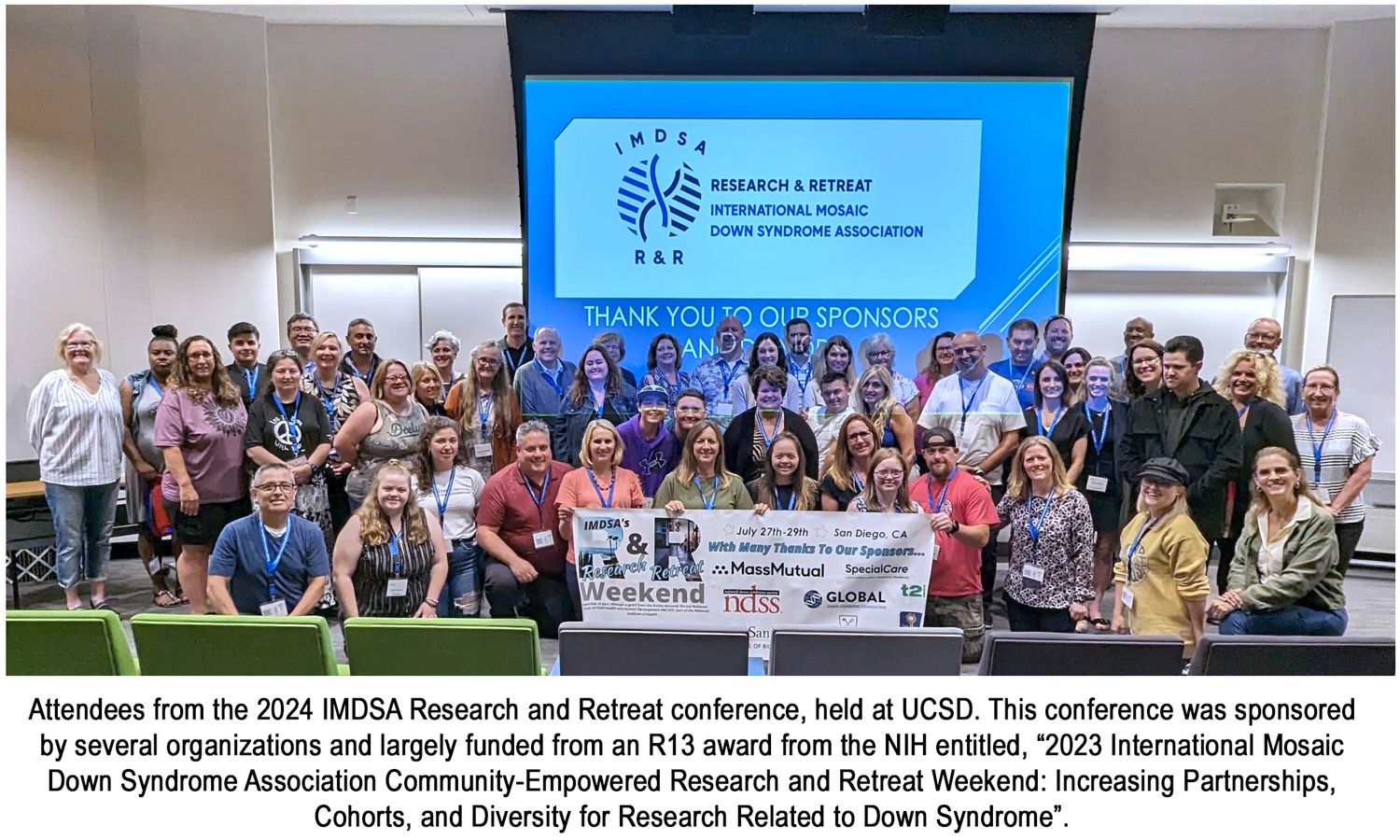
Grant “2023 International Mosaic Down Syndrome Association Community-Empowered Research and Retreat Weekend: Increasing Partnerships, Cohorts, and Diversity for Research Related to Down Syndrome” (R13 HD112166), Jackson-Cook, PI.
This conference provided an innovative approach for advancing research participation opportunities and knowledge sharing related to mosaic and non-mosaic Down syndrome, by bringing researchers/professionals to self-advocates and their family members/care providers in a collaborative and supportive setting that is most convenient for the participants.
This conference also helped: (1) build and/or expand relationships among researchers, clinicians, social scientists, educators, and members of the mosaic/non-mosaic Down syndrome community; and (2) provide a means for reducing disparities in knowledge and/or research participation opportunities by focusing on the inclusion of people who have an uncommon form of Down syndrome (called mosaic Down syndrome) and by targeting recruitment activities and strategies to enhance the inclusion of participants and trainees from minority groups. 
Supported by the Eunice Kennedy-Shriver National Institute of Child Health & Human Development of the National Institutes of Health [NIH/NICHD/NIA].
Twin Project
This research project focuses on identifying the inter-relationship(s) between cystolic DNA and biological aging hallmarks, such as telomeres, senescence, and DNA methylation changes. Cytosolic DNA, which is acquired in somatic cells, is emerging as an instigator/integrator of cellular functions associated with aging, yet the causes/consequences of cytosolic DNA are poorly understood. Do individuals have a genetic predisposition to develop cytosolic DNA or is its frequency most heavily influenced by environmental factors? Is cytosolic DNA an early trigger for the acquisition of other age-related biomarker hallmarks, or does it arise in response to perturbations involving a subset of these hallmarks? To answer these primary questions, her team will complete a longitudinal study (10 to 15 years timeframe) of 100 twin pairs [200 individuals] who are discordant or concordant for cytosolic DNA frequencies. The twins will vary in age (currently 22 to at least 80 years of age) to allow her team to chronicle associations between aging hallmarks and the acquisition of cytosolic DNA. The information gained from this study could lead to the development of a health screening test(s) and/or identify new therapeutic targets for developing treatments to alleviate symptoms of age-related health conditions.
Research supported by the National Institute on Aging of the National Institutes of Health
Location:
The Jackson-Cook research lab is in Biotech 8, Suite 104.
Dr. Jackson-Cook’s Mentoring Philosophy:
- A successful mentor nurtures a trainee’s talents to enable them to gain skills/knowledge and access to resources for lifelong learning, as well as strategies to enable them to flourish in the career of their choice.
- A successful mentoring relationship results in an enrichment of factual and cultural understanding, professional development, and growth opportunities for both parties.
Career Development

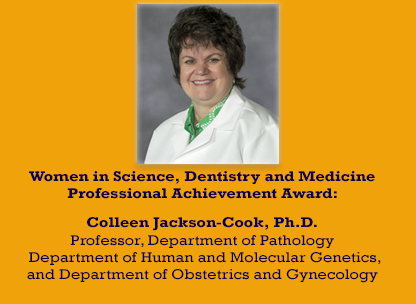
VIDEO: Buccal specimen collection
VIDEO: Adding slides for transport
Contact Us
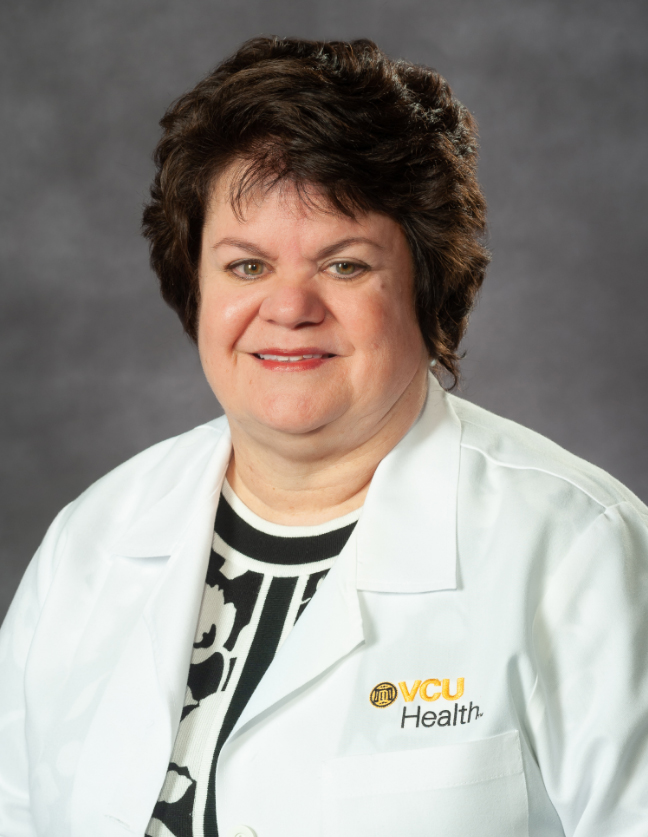
Colleen Jackson-Cook, PhD
Molecular Cytogenetics

Colleen Jackson-Cook, PhD
Molecular Cytogenetics
Pathology
Professor of Pathology, Human & Molecular Genetics, and OB/GYN;
Director of the Cytogenetic Diagnostics Laboratory Division of Molecular Diagnostics
Program Director, LGG Fellowship
Phone: (804) 628-2992
Fax: (804) 828-4242